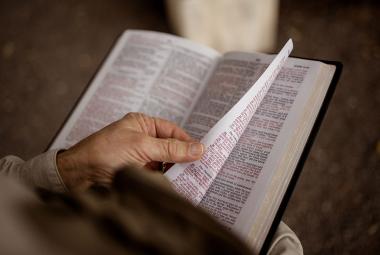There are twelve "minor" prophets that are yet to be really discovered by most Christians. (They are called "minor" simply because they are smaller - shorter, more terse, and concise.) Yet they contain some of the most fascinating and provocative prophecies you'll find anywhere in the Scriptures. Here's a glimpse of two of them.
Joel
Joel is a short little book (only three chapters, 73 verses) devoted almost entirely to the most climactic period in all Scripture: "The Day of the Lord," the final climax that we are all looking forward to. It's surprising that even students of prophecy seem to overlook this little gem. The very name Joel means, "Yahweh is God." As we learn to recognize that Revelation 9 - 19 has Israel as its primary focus, we should not be surprised that most of what we know about that period is from the Old Testament, and much of that from this fascinating little book.
The Day of the Lord
The primary theme in the book of Joel is The Day of the Lord. It's an important book because it records Israel's place in God's program: from Babylon all the way through to the Millennium. Joel also has a lot to say about the Gentile nations and their collision course to Armageddon. Joel's second chapter reads like news camera footage of modern combat helicopters and troops in action! Except the cosmic effects are most terrifying:
The earth shall quake before them; the heavens shall tremble: the sun and the moon shall be dark, and the stars shall withdraw their shining The sun shall be turned into darkness, and the moon into blood, before the great and the terrible day of the LORD come.
Joel 2:10, 31
Peter also recognized that the astonishing events of Pentecost in Acts Chapter 2 were ushering in the preparation for the end times, and he quoted from Joel to make his point.1 (However, the sun did not darken; the moon did not turn to blood; and the Lord didn't appear with wrath against the nations.) Peter knew well that the Day of the Lord had not come yet: he says so in 2 Pet 3:10. Pentecost was a fulfillment in miniature: Joel saw the end point of the whole process; Peter focused on the onset. This was a guarantee that God would complete the entirety: an inauguration; the firstfruits. (Notice: There is no reason to restrict Peter's statement about the gifts of the Spirit to one particular occasion. If the Spirit was given at Pentecost, and Joel described it to include the final Day of the Lord, there is no basis to exclude the gifts today - since we are certainly still between these two points of time!) Joel also includes some timely details of the climax:
I will also gather all nations, and will bring them down into the valley of Jehoshaphat, and will plead with them there for my people and for my heritage Israel, whom they have scattered among the nations, and parted my land.
Joel 3:2
"Scattered among the nations," we understand; but "parted my land"? That sure has implications for our current news headlines! 2
Amos
People always ask me, where is the United States in prophecy? I usually point them to Amos (and Hosea). Amos was a sheepherder from Tekoa (6 miles south of Bethlehem) in the Southern Kingdom, but he was sent to carry the Lord's message to the Northern Kingdom (Israel).3 Jeroboam II (793-753 B.C.), 4th king of the Jehu dynasty, ruled in Samaria, the capital of the Northern Kingdom, which was experiencing a boom of prosperity from his father Joash (Jehoash);4 he would have a reign of 41 years.5 His military strength had prospered the Northern Kingdom: the Lebanon coastal plain had been retaken from Syria; Damascus itself was subjugated. He controlled pagan Moab to the southeast. Jeroboam II's father, Jehoash (Joash) had defeated Judah in war and Jeroboam II retained strength over the Southern Kingdom (Judah) to the south.6
Thus, Jeroboam II's strategic position was ironclad: Syria was a buffer against Assyria to the east, Judah a buffer against Egypt to the south, and the Mediterranean to the west. They enjoyed peace and the power of conquest for over 41 years, with new markets and trade in every direction; a growing wealthy class with summer and winter homes; and, a BMW in every garage... From their point of view, "it was the best of times."
Idolatry
However, Jeroboam I (931-910 B.C.) had instituted idolatry 150 years earlier at Dan and Bethel7 (analogous to Aaron's golden calf 700 years earlier). From God's point of view, however, it was a time of idolatry, sexual immorality, violence, injustice and oppression of the poor. From God's point of view, "it was the worst of times." They did not welcome the uninvited prophet from the south. After a brief survey of the horizon of six surrounding heathen nations, and his own region of Judah, Amos then zeroes in on the Northern Kingdom with a message somewhat comparable to that of his contemporary, Hosea. He detailed God's indictment against the nation that had abandoned its heritage. Failing to heed Amos' warnings resulted in the destruction of the entire nation. Samaria, their capital, fell to their enemies the Assyrians in 722 B.C.
The parallel to the United States is most disturbing: we, too, feel that we have "the best of times." However, we have abandoned our heritage. We regard homosexuality as simply an alternative lifestyle. We change marriage partners like fashion statements. We murder babies that are socially inconvenient. Our entertainment industry celebrates violence, immorality, sexual aberrations of every imaginable kind, and every conceivable form of evil. We have become the primary exporters of everything God abhors! From God's point of view, "it is the worst of times." Amos' indictment and summons are very timely for us today.
I tremble for my country when I recall that God is just, and that His justice will not sleep forever. -Thomas Jefferson
Notes:
- Acts 2:15-21, quoting Joel 2:28-32.
- Zechariah 12:2-3.
- Joel is quoted in Amos 1:2 (Joel 3:16, 18), which means his book was already in existence when Amos wrote.
- 2 Kings 13:25; 14:11-15.
- 2 Kings 14:23.
- 2 Kings 14:11-14, 23-28
- 1 Kings 12:26-33.






